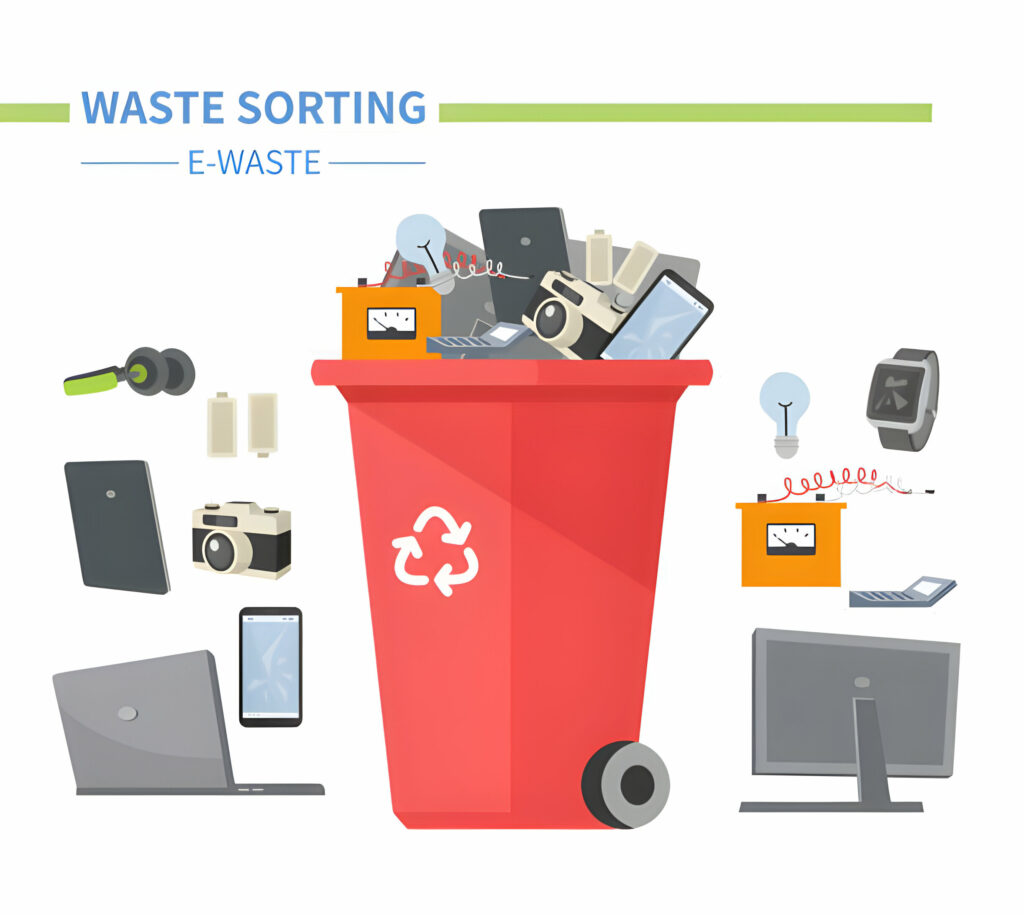The United Arab Emirates is one of the top nations in the world for fast digitalization. It is one of the top users of digital devices. E-waste has significantly increased as a result of this use of electronic gadgets. To address this potential concern, the government has implemented numerous e-waste management projects around the Emirate.
As a result, Dubai today boasts one of the top e-waste disposal systems to satisfy the nation’s recycling needs. Numerous businesses offer facilities for the recycling and disposal of e-waste.
Let’s review the fundamentals of e-waste, its handling, and Dubai’s recycling process.
E-waste: What Is It?
Electronic equipment that has outlived its usefulness is known as e-waste. It contains everyday objects like fans, lamps, printers, and cell phones. Even though these items have expired, they still contain hazardous metal compounds that need to be disposed of correctly.
The sustainability of the environment and ecosystems are seriously threatened by inadequate e-waste disposal. This detrimental effect has grown at a startling rate in recent years. UAE, on the other hand, is among the top nations that have made significant progress in resolving the problem. Now let’s examine electronic waste management in Dubai process.
Recycling Electronic Waste in Dubai
Dubai’s government, in collaboration with private sector entities, has implemented robust recycling programs to address this issue. Collection centers and specialized facilities are strategically located across the city, providing convenient avenues for residents and businesses to responsibly dispose of their electronic devices.
Through innovative recycling processes, valuable materials such as metals, plastics, and glass are extracted from e-waste and repurposed for manufacturing new products. This not only conserves finite resources but also reduces the environmental impact associated with mining and production.
Moreover, electronic waste recycling Dubai contributes to the circular economy, fostering economic growth while minimizing waste generation. By raising awareness and incentivizing recycling efforts, Dubai aims to create a sustainable future where electronic devices are recycled responsibly, preserving the environment for generations to come.
Recycled electronic waste plays a major role in Dubai
From smartphones and laptops to household appliances and industrial machinery, electronic gadgets have become indispensable in both personal and professional spheres. However, with this surge in technology adoption comes a pressing concern: the accumulation of electronic waste (e-waste). In this brief, we delve into the imperative need for recycling electronic waste in Dubai, exploring the environmental, economic, and social ramifications of unchecked e-waste disposal.
1)Environmental Impact:
The environmental impact of e-waste cannot be overstated. Electronic devices contain a myriad of hazardous substances, including lead, mercury, cadmium, and brominated flame retardants. When improperly disposed of, these toxic materials leach into the soil and water, contaminating ecosystems and posing significant health risks to humans and wildlife alike.
Dubai, with its rapid urbanization and consumption-driven economy, faces a growing e-waste crisis. As residents and businesses upgrade to newer, more advanced gadgets, obsolete electronics are often discarded without proper consideration for their environmental impact. Landfills become inundated with electronic waste, exacerbating pollution levels and contributing to environmental degradation.
Moreover, the extraction and processing of raw materials for electronics production further exacerbate environmental concerns. Mining activities associated with obtaining metals such as gold, silver, and copper result in habitat destruction, deforestation, and water pollution. Electrical waste collection in UAE can reduce its reliance on virgin resources, conserving energy and minimizing environmental harm.
Economic Implications:
Beyond its environmental toll, e-waste poses significant economic challenges. The disposal of electronic waste is not only costly but also inefficient, as valuable resources are lost when electronics are discarded rather than recycled. In Dubai, where economic diversification and sustainability are key priorities, the need for efficient resource management is paramount.
Recycling e-waste presents an opportunity to recover valuable materials and reintegrate them into the production cycle. Precious metals, rare earth elements, and other recyclable materials can be extracted from electronic devices and reused in manufacturing processes, reducing the need for virgin resources and lowering production costs.
Furthermore, the recycling industry has the potential to generate employment opportunities and stimulate economic growth in Dubai. By investing in e-waste recycling infrastructure and fostering a culture of sustainability, the city can create green jobs and support local businesses involved in recycling and resource recovery.
Social Responsibility:
As a global city with a diverse population, Dubai has a responsibility to prioritize the well-being of its residents and communities. The improper disposal of e-waste not only harms the environment but also jeopardizes public health and safety. Toxic substances released from decomposing electronics can contaminate air, soil, and water sources, posing serious health risks to nearby communities.
Additionally, electronic devices often contain sensitive data that, if not properly erased, can compromise privacy and security. Recycling e-waste through certified facilities ensures that data is securely erased and devices are disposed of in an environmentally responsible manner, mitigating the risk of data breaches and identity theft.
Moreover, by promoting electronic waste collection Dubai can foster a culture of sustainability and social responsibility among its residents and businesses. Education and awareness campaigns can empower individuals to make informed choices about electronic consumption and disposal, leading to more sustainable practices and a healthier environment for future generations.
In conclusion,
The need for recycling electronic waste in Dubai is undeniable. As a city at the forefront of technological innovation and economic development, Dubai must confront the challenges posed by e-waste and embrace sustainable solutions. By recycling e-waste, Dubai can mitigate environmental pollution, conserve valuable resources, and stimulate economic growth. Moreover, e-waste recycling promotes social responsibility, safeguarding public health and fostering a culture of sustainability. Through collaborative efforts between government, industry, and civil society, Dubai can pave the way towards a greener, more sustainable future for generations to come.

